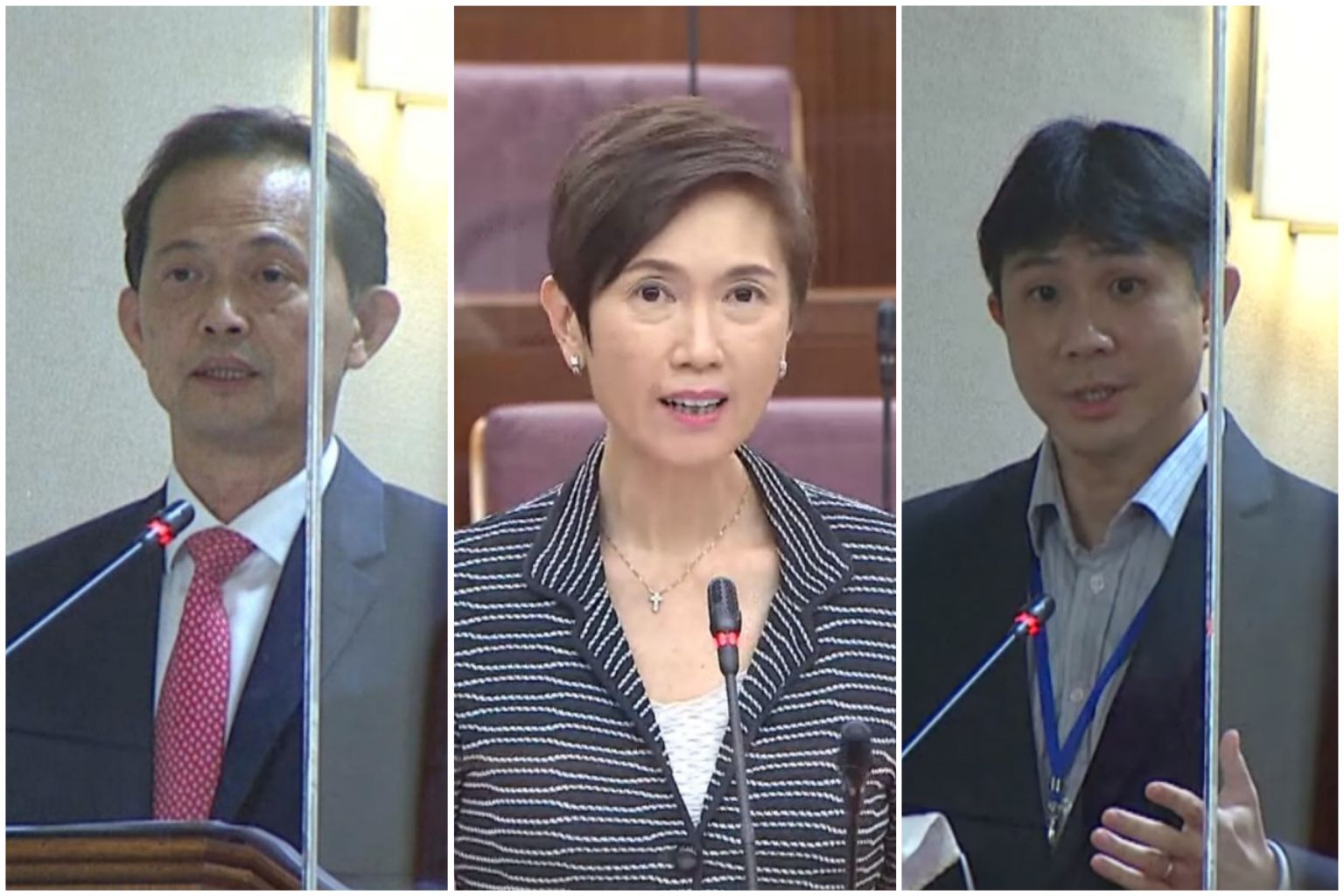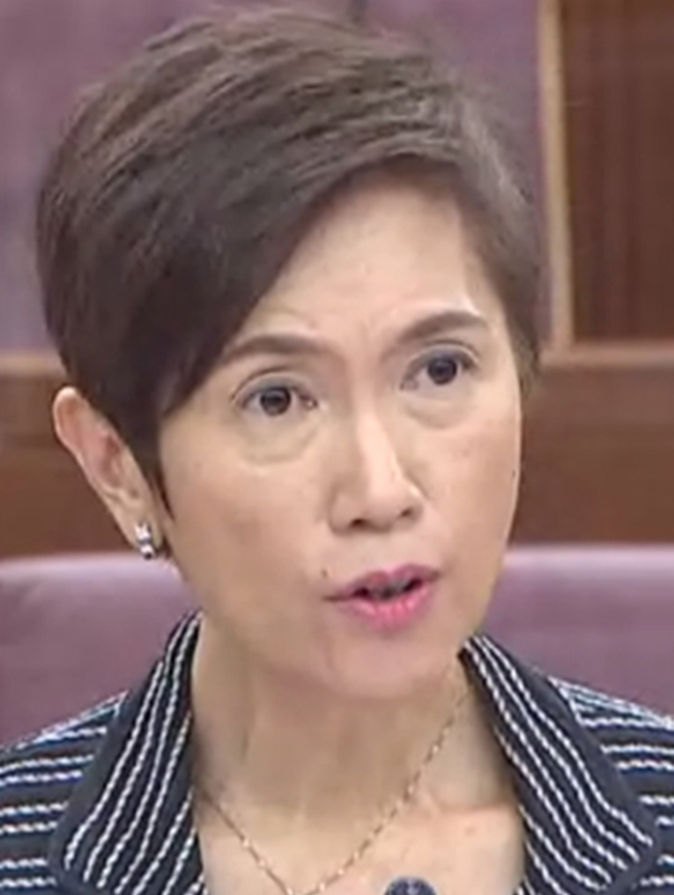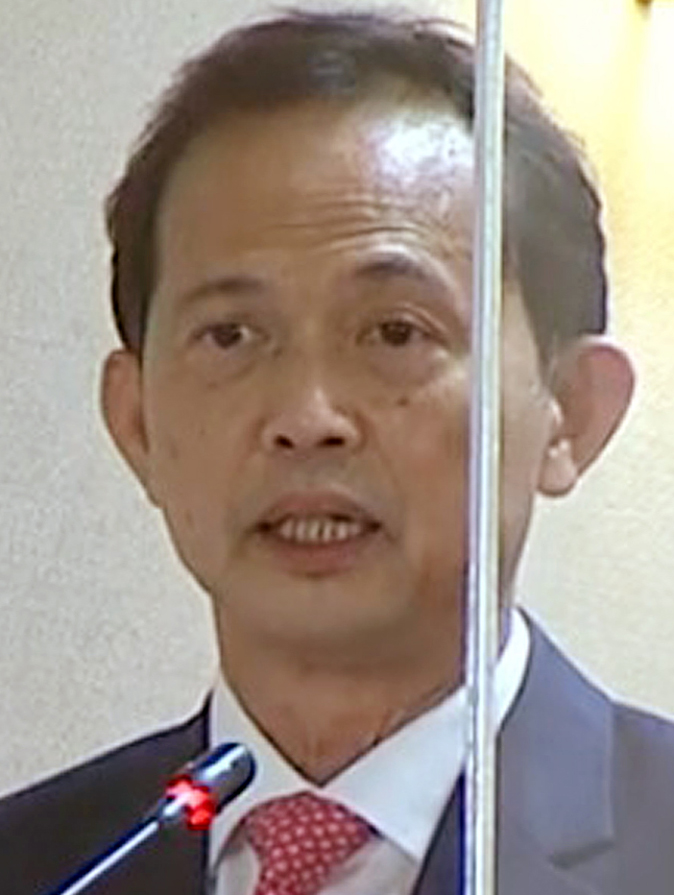Parliament
Minister, opposition MPs spar over efforts to protect local PMETs
NCMP's response to growth data on jobs, Employment Passes, S Passes sparks debate
Sign up now: Get ST's newsletters delivered to your inbox

(From left) NCMP Leong Mun Wai sparked a debate in Parliament, with Manpower Minister Josephine Teo fielding questions from opposition MPs, including Dr Jamus Lim.
PHOTO: GOV.SG
Follow topic:
A question posed by Non-Constituency MP Leong Mun Wai sparked a protracted debate in Parliament yesterday, with several opposition MPs questioning Manpower Minister Josephine Teo on the Government's efforts to protect local PMETs from being displaced by foreigners.
In her speech, Mrs Teo said the number of locals in professional, manager, executive and technician (PMET) jobs has grown by about 35,000 a year on average between 2014 and last year. In the same period, the number of Employment Pass (EP) and S Pass holders grew by fewer than 9,000 a year, she added.
Mr Leong, from the Progress Singapore Party, asked how many people became permanent residents (PRs) and new citizens during that period. He added that previously reported data put the number at around 50,000 a year.
Mrs Teo acknowledged that around 20,000 people become citizens every year, while another 30,000 become PRs. "I think what Mr Leong is trying to suggest is that all of your gains are meaningless because they are all occupied by PRs and citizens," she said.
But this is not the case, the minister added. A significant number of new citizens and PRs are children who are not part of the workforce, while others are married to citizens. One in three marriages now is between a citizen and non-citizen, she noted.
"Is Mr Leong suggesting that these new citizens are any less of a citizen? Is Mr Leong suggesting therefore that we should discount them, not include them?" Mrs Teo asked.
She suggested that Singaporeans should instead look at the bigger picture of the increased proportion of locals in PMET jobs, and decide if this is an "amazing accomplishment" not easily achieved elsewhere.
She also asked Mr Leong if Singapore should start distinguishing between new citizens and "real" citizens, and, if so, how many years of citizenship would qualify a person as a "real" citizen.
Replying, Mr Leong said: "Whether it's the original Singaporeans or the new Singaporeans, we actually do not make that distinction."
He added that his issue was with the impact of each year's crop of new citizens and PRs on the existing population. If there are 50,000 new citizens and PRs each year, but the number of locals in PMET jobs increases by only 35,000, then there is an undeniable pressure on the PMET job market, he said. "So the situation is not as rosy as what you have painted."
Mrs Teo acknowledged his point of view, but reiterated her earlier points that many new citizens and PRs are either not in the workforce or married to Singaporeans.

"They have a family nexus. Are we to say: 'Please don't work. Please be out of the workforce,'" she asked. "I don't believe Mr Leong is saying that at all. However, this constant obsession - if I may put it that way - with drawing lines, I'm not sure is good for us as a society."
She urged MPs to consider these issues carefully and think about the values and attitudes that drive such questions.
"It is not that the question cannot be asked, but I think we have to search our hearts and ask ourselves, before asking these questions: What is our thinking? What is our attitude? And what is the value that we are expressing by even putting this question forward?"
When Mr Leong rose again, Speaker Tan Chuan-Jin pointedly asked him if he was going to answer the minister's questions. "It's fine if you don't want to answer the question posed to you," Mr Tan added.
Mr Leong moved on to ask about another issue.
Workers' Party MP Jamus Lim (Sengkang GRC) then asked if the Government believes that slowing down the growth of EP and S Pass holders is sufficient to prevent local PMETs from getting displaced.
He added that it is misleading to compare both numbers, given that the overall base numbers in both groups are different. This means the slowdown in the growth rate of EP and S Pass holders is "less dramatic" than what Mrs Teo said.
Many PMET positions may have already been filled by foreigners, Associate Professor Lim added, making it no surprise that the required number of EP and S Pass holders has gone down.

Mrs Teo replied: "I merely stated the facts, I did not say that one contributed to the other. I stated the facts; this is what they were."
As for Prof Lim's question on whether Singapore is satisfied with how much it has slowed the growth rate of EP and S Pass holders, Mrs Teo said her ministry has four aims.
These are to keep employment high and unemployment low, as well as help Singaporeans achieve income growth and retirement adequacy. If this can be done without using foreigners as a complement to the workforce, and reducing the reliance on manpower-intensive methods of work in certain sectors, the answer is yes, she said.
But Singapore, as a small city-state, has constraints. Still, it needs to find the best solutions, she added.
She asked the House to imagine a scenario where the number of EP and S Pass holders has shrunk significantly, and likewise, the job opportunities for Singaporeans. "Is that going to be better for us? Well, we'll have to think very hard about whether the answer is yes."

